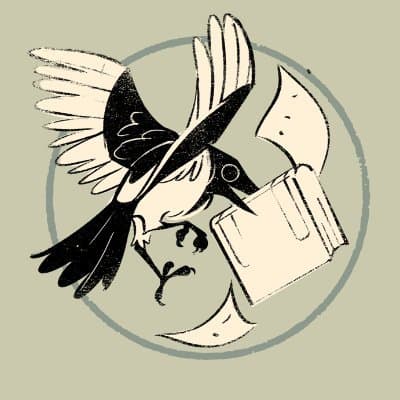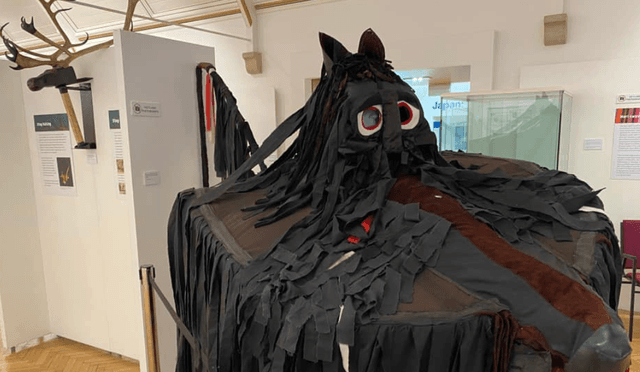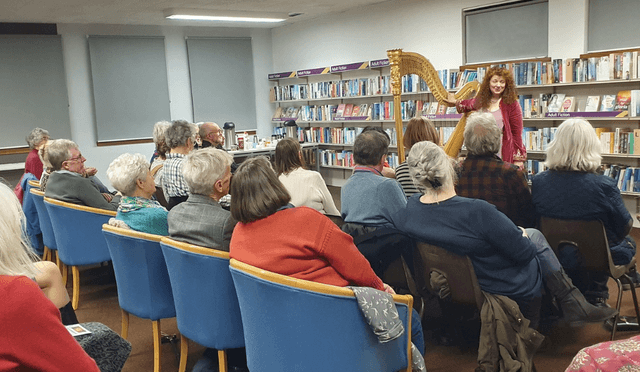Community Story: The Folklore Library and Archive
"Folklore brings with it a sense of identity. It is what makes a person part of their community, part of the landscape around them (wherever that may be) and part of a shared understanding of their role within any community."
We always enjoy finding out about the origins of the charities we profile, they are sometimes rooted in very personal challenges, perhaps come from a frustration at a lack of solutions to a problem or often are just borne from the desire to improve their community. Today’s focus though is on one that has quite unique origins. The Folklore Library and Archive developed out of a long running podcast - The Folklore Podcast . The podcast has an aim to bring free access to the world's experts in the field of folklore and those working with folklore materials, and it became apparent that was so much more that could be done.
From this, the Folklore Library and Archive ( @LibraryFolklore ) in Devon was created and then built up to become its own Charitable Incorporated Organisation. Its main constitution aims to continue the ethos of the podcast - to collect and preserve folklore and heritage materials in all formats and, crucially, to make them freely available for the benefit of all through open access.
Our head of communications, Luke Upton, recently sat down with its Founding Creator (and the host of the podcast), Mark Norman to find out more about their work, aims and the impact of their recent grant from National Grid.
Luke Upton (LU): Thanks for the time today, your origin story is fascinating and you’ve been very busy since starting, give us a little insight into some of the things that you’ve done.
Mark Norman (MN): No problem, Luke. We've done loads of important work in such a short space of time (and yet still have no paid staff on income outside of what we can fundraise when we have the time as volunteers!) One of the first projects was to fundraise a significant amount of money in a very short space of time to secure the purchase of two sets of document archives belonging to the late folklorist Venetia Newall to ensure they were not lost. Her physical collections were donated to the British Museum, such was their importance, but the document archives had been placed on the open market. We managed it, inside of a month, thanks to a big online weekend event with some great speakers from the GLAM sector and a big crowdfunder. Since then, we have built up a large print archive, developed our cloud-based digital archives and are acting as project partners on two important national funding bids. Plus, our charity patron is the children's author Michael Rosen. If we could do all that on nothing, imagine what we could do once we get more established!

"We never could have dreamed the programme would have been as successful as it has. It has provided vital help and health and well-being support to many, and they have loved it."
LU: Fantastic! New(ish) platforms like podcasts, of which you have an excellent one yourself seem to have reignited an interest in folklore, what do you think accounts for continued fascination with the area?
MN: Folklore brings with it a sense of identity. It is what makes a person part of their community, part of the landscape around them (wherever that may be) and part of a shared understanding of their role within any community. It isn't just about old superstitions and curious customs. Anyone with a shared interest is part of a folk group and makes one who they are. Podcasts, alongside social media and the internet more generally helps to foster this. In turbulent global times, there is also a sense of that nostalgic past which folklore and tradition also supports.

LU: You received funding from the National Grid Community Matters Fund (Fuel Poverty) for a series of events, can you tell us more about them?
MN: We received funding from the Community Matters Fund to provide a programme of free events though the winter in a warm space as part of the national initiative to help to combat fuel poverty. Our aim was to fit in with our underlying ethos - provide a diverse programme where people could come and enjoy professional presenters for whom tickets would normally not be cheap, free of charge whilst at the same time saving on their own home heating. The programme looked to be entertaining and education, supporting health and well-being through being stimulating and fostering a sense of community. It has been phenomenally successful with capacity audiences enjoying a professional harp recital (see below), storytelling, lectures, games, film screenings and much more. As time has gone on, we have seen increased numbers of repeat bookings, leading to a building of our own community. People are clamouring for us to carry on after the grant funding finishes with more events in the summer.
LU: What a brilliant project, so how important is the support you’ve received from National Grid and Localgiving?
MN: Simply put, we could not have run this programme without the support of National Grid and Localgiving. It has allowed us to cover the costs of the venue and utilities and book presenters without having to beg favours and free work (nobody likes doing that - this is a living for these people too) and not have to charge anyone a penny to enjoy it. We have saved people hundreds of hours of domestic heating bills, grown a close community within our audience, and snuck in a load of education benefits too! We never could have dreamed the programme would have been as successful as it has. It has provided vital help and health and well-being support to many, and they have loved it. Thank you so much!

LU: We are delighted to be able to support. So, as we always like to ask, funding aside, what would most help you in 2024?
MN: People! Volunteers! Those would be the biggest help in 2024. We are still very new, and we need to look at more ways that we can grow and develop, and we need people to help us to do that. There are loads of opportunities for those with an interest in the subject - if they are in the mid-Devon area then they can volunteer to work with our collections on site, or at events, but we love virtual volunteers and people can help us from all over the world. From image collectors to digital librarians, fundraisers to social media experts. If you like folklore, you'll like helping us, and we want to hear from you. Drop us an email and say hi.
LU: Great, before we finish up, is there anything else you’d like to share with our community.
MN: Our biggest action point right now if the fact that our physical home (space within a public library) is no longer able to sustain our growth and so we need to look at ways to move our archives to somewhere else and look to establish a home which we can develop to be a community hub for our events, library access, education and research and more. This is a massive project for a charity at the start of its journey, but looking at what we have done so far, we will find a way. And we hope that people want to join us and help to achieve it with us too.
LU: Thank you, we look forward to following your progress.
